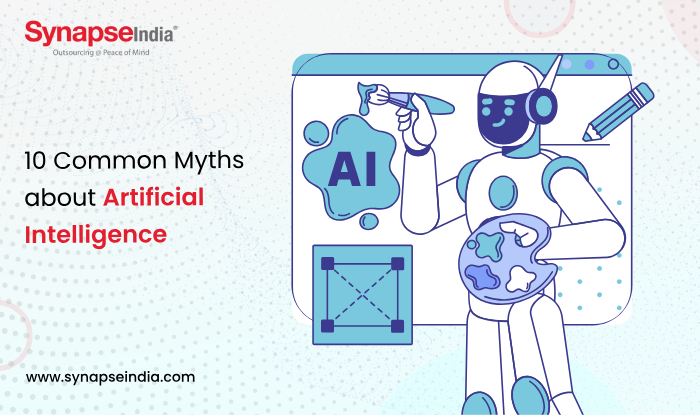 07 May 2024
07 May 2024
In recent years, artificial intelligence (AI) has gained popularity and captured the interest of both the general public and technologists. AI is a game-changing technology that has the potential to completely change a range of sectors, including healthcare and finance, by enabling robots to carry out jobs that traditionally need human intelligence. But despite all of the excitement over AI, several false beliefs and myths have surfaced, making it difficult to appreciate both its strengths and weaknesses. We'll go into the definition, uses, and frequent misconceptions around artificial intelligence in this introduction to this ground-breaking technology. We hope to create a better understanding of AI's potential and how it can affect our lives in the present and the future by illuminating its realities.

Let's delve deeper into each of the common myths about artificial intelligence and provide more detailed explanations:
While repetitive tasks like data entry can be automated by AI, it is doubtful that AI will completely replace human labor in the workforce. AI is yet unable to fully replace human abilities such as creativity, critical thinking, emotional intelligence, and interpersonal communication, which are necessary for many occupations.
While huge firms with substantial resources may be able to develop certain sophisticated AI applications, businesses of all sizes can access various AI tools and platforms. Open-source libraries, cloud computing platforms, and AI-as-a-service providers have made AI technology more accessible, allowing startups and small enterprises to make use of its advantages.
Robotics is one obvious use of artificial intelligence, although the term refers to a wide range of tools and methods, such as computer vision, natural language processing, machine learning, and more. AI is not so much about building physical robots as it is about building intelligent systems that can see, think, learn, and act on their own.
AI systems are not impervious to mistakes, prejudices, or constraints, despite their talents. AI algorithms may be prejudiced as a result of erroneous assumptions or biased training data, which can provide discriminating results or erroneous predictions. To detect and reduce biases and errors, AI systems must be constantly monitored and assessed.
Though AI systems are capable of astounding feats like picture recognition or natural language understanding, they are devoid of subjective experiences, emotions, and consciousness. Artificial intelligence (AI) lacks human self-awareness, empathy, and worldview; instead, it functions only on algorithms and data.

Although technical expertise may be necessary for AI creation and deployment, many AI tools and platforms are made to be easily navigable and accessible by non-technical people. The ability to harness AI capabilities for a variety of applications is made possible for non-technical people via user-friendly interfaces, drag-and-drop tools, and pre-built AI models.
This fallacy frequently originates from science fiction's dystopian stories, which present AI as a malicious entity out to conquer humanity. In actuality, laws, protections, and ethical precepts govern AI development to guarantee its responsible and advantageous application. Artificial Intelligence is a technology that humans have created and controlled, and human values and goals have affected its evolution.
Although AI is highly proficient in data analysis and pattern recognition, it is not infallible. Since AI predictions are probabilistic by nature and are dependent on historical data, they might not always correctly predict future events, particularly in dynamic and complex situations. Predictions that are off can be caused by unforeseen circumstances, anomalies, or modifications to underlying trends.
Although artificial intelligence has come a long way in the last few years, its origins may be found in the middle of the 20th century. The foundation for contemporary AI was established by early AI pioneers like Alan Turing and John McCarthy, and over the years, AI research has experienced numerous waves of innovation and advancement. Decades of research, development, and improvement have resulted in the AI of today.
It takes more than just implementing AI models or algorithms to apply AI effectively. The ideal use of AI is in workflows, processes, and broader systems; it enhances and complements current capabilities. Collaboration between disciplines, including data science, engineering, domain expertise, and business strategy, is necessary for the successful implementation of AI. Providing comprehensive solutions that tackle difficult problems, frequently entails merging AI with other technologies, like automation, big data analytics, cloud computing, and the Internet of Things.
It is crucial to dispel these widespread misconceptions regarding artificial intelligence to promote a better understanding of this game-changing technology. By clearing up misunderstandings and resolving issues, we can fully utilize AI's potential to spur creativity, increase productivity, and tackle difficult problems in a variety of sectors. Even if artificial intelligence (AI) has many benefits and drawbacks, its research and application must take ethical, societal, and technological concerns very seriously. We can endeavor to exploit AI's benefits while minimizing hazards if we have a firm grasp of its limitations. This will guarantee that AI acts as a beneficial force for change in our quickly changing environment.

